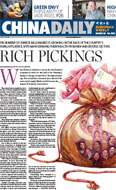Op-Ed Contributors
A giant step toward solutions
Updated: 2011-03-22 07:56
By Stephen S. Roach (China Daily)

I suspect history will judge the 12th Five-Year Plan (2011-2015) as a watershed event in the development of modern China. If so, this will be the third time that a plan has triggered a significant shift in the nation's economic strategy. The Fifth Five-Year Plan (1976-1980) ushered in the "reform and opening-up" of Deng Xiaoping. The Ninth Five-Year Plan (1996-2000) set the stage for a historic ownership transition - leading to an era of State-owned enterprise reform and the corporatization of China's increasingly marketized economy.
The just-enacted 12th Five-Year Plan is, first and foremost, a strategic framework aimed at changing the economy's remarkably successful growth structure of the past 30 years. It shifts the focus away from a powerful export- and investment-led growth dynamic toward an approach aimed at drawing more support from China's 1.3 billion consumers.
This will be a daunting transition. While absolutely essential in order to take the Chinese economy to the next stage, a pro-consumption model also introduces new and important tactical challenges. The key will be for China to strike the right balance between strategy and tactics. The stakes are enormous - for China and for the broader global economy.
Like all of modern China's plans, the 12th Five-Year Plan is a comprehensive statement of the government's strategic policy priorities over a multi-year time horizon. In his annual address to the National People's Congress on March 5, Premier Wen Jiabao offered the first public summary of the new plan. The goals and targets span the gamut - from wheat price subsidies and low-income housing to energy conservation and R&D spending. I counted about 75 separate initiatives in the premier's overview of the plan and another 150 initiatives in his depiction of the policy agenda for 2011 - the first year of the five-year plan.
Four years ago, he framed his concerns in the context of the "four uns" - a Chinese economy that was strong on the surface but beneath the surface was increasingly "unstable, unbalanced, uncoordinated, and ultimately unsustainable". In the Government Work Report of 2011, he breaks the "uns" down into two buckets - domestic concerns that he still depicts as unbalanced, uncoordinated, and unsustainable, and international concerns that he describes as unstable.
This is a subtle but very important distinction. Stability is China's ultimate tripwire - whether it is cast in terms of economic, political, or social stability. China will do everything in its power to avoid instability. As such, Wen Jiabao's characterization of global factors as being unstable - especially, sluggish post-crisis growth, surging global liquidity, rising commodity prices, and mounting protectionist risks - is quite telling. All this leaves China with little choice other than to view internal demand - especially private consumption - as the antidote to the instability of external demand.
E-paper

City of Joy
Welcome to the 'world of smiles' where life meanders slowly.
Preview of the coming issue
Debate on nuclear power revived
The future is now
Specials

Beloved polar bear died
Berlin's beloved polar bear Knut, an international star died Saturday.

Panic buying of salt
Worried Chinese shoppers stripped stores of salt on radiation fears.

'Super moon'
The "Super Moon" arrives at its closest point to the Earth in 2011.
